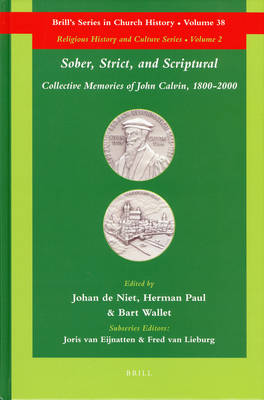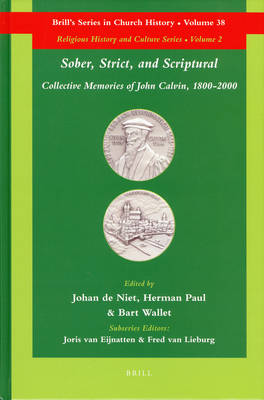
- Afhalen na 1 uur in een winkel met voorraad
- Gratis thuislevering in België vanaf € 30
- Ruim aanbod met 7 miljoen producten
- Afhalen na 1 uur in een winkel met voorraad
- Gratis thuislevering in België vanaf € 30
- Ruim aanbod met 7 miljoen producten
Zoeken
Sober, Strict, and Scriptural: Collective Memories of John Calvin, 1800-2000
€ 236,95
+ 473 punten
Omschrijving
Calvinism's influence and reputation have received ample scholarly attention. But how John Calvin himself - his person, character, and deeds - was remembered, commemorated, and memorialized, is a question few historians have addressed. Focussing on the nineteenth and twentieth centuries, this volume aims to open up the subject with chapters on Calvin's monumentalization in statues and museums, his appearance in novels, children's books, and travel writing, his iconic function for Hungarian nationalists and Presbyterian missionaries to China, his reputation among Mormons and freethinkers, and his rivalry with Michael Servetus in French Protestant memory. The result is a fresh contribution to the field of religious memory studies and an invitation to further comparative research.
Contributors include: R. Bryan Bademan, Patrick Cabanel, R. Scott Clark, Thomas J. Davis, Stephen S. Francis, Joe B. Fulton, Botond Gaál, Stefan Laube, Johan de Niet, Herman Paul, James Rigney, Michèle Sacquin, Jonathan Seitz, Robert Vosloo, Bart Wallet, and Valentine Zuber.
Contributors include: R. Bryan Bademan, Patrick Cabanel, R. Scott Clark, Thomas J. Davis, Stephen S. Francis, Joe B. Fulton, Botond Gaál, Stefan Laube, Johan de Niet, Herman Paul, James Rigney, Michèle Sacquin, Jonathan Seitz, Robert Vosloo, Bart Wallet, and Valentine Zuber.
Specificaties
Betrokkenen
- Uitgeverij:
Inhoud
- Aantal bladzijden:
- 393
- Taal:
- Engels
- Reeks:
- Reeksnummer:
- nr. 38
Eigenschappen
- Productcode (EAN):
- 9789004174245
- Verschijningsdatum:
- 24/04/2009
- Uitvoering:
- Hardcover
- Formaat:
- Genaaid
- Afmetingen:
- 168 mm x 244 mm
- Gewicht:
- 798 g

Alleen bij Standaard Boekhandel
+ 473 punten op je klantenkaart van Standaard Boekhandel
Beoordelingen
We publiceren alleen reviews die voldoen aan de voorwaarden voor reviews. Bekijk onze voorwaarden voor reviews.










